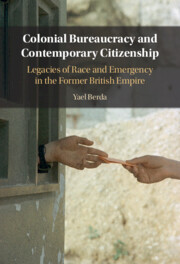Book contents
- Colonial Bureaucracy and Contemporary Citizenship
- Colonial Bureaucracy and Contemporary Citizenship
- Copyright page
- Contents
- Figures
- Preface
- Acknowledgments
- Archive Abbreviations
- Introduction: The Spectacle of Independence and the Specter of Bureaucracy
- Part I Hybrid Bureaucracy: How Race and Emergency Shaped the Organization of Colonial Rule
- Part II The Axis of Suspicion: Classifications of Identity and Mobility in Crises
- Part III Administrative Memory and the Legacies of Emergency
- 4 Loyalty and Suspicion: The Making of the Civil Service after Independence
- 5 How Hybrid Bureaucracy and Permit Regimes Made Citizenship
- Conclusion: The File and the Checkpoint – Colonial Bureaucracy and the Making of Contemporary Citizenship
- Notes
- Bibliography
- Index
4 - Loyalty and Suspicion: The Making of the Civil Service after Independence
from Part III - Administrative Memory and the Legacies of Emergency
Published online by Cambridge University Press: 10 November 2022
- Colonial Bureaucracy and Contemporary Citizenship
- Colonial Bureaucracy and Contemporary Citizenship
- Copyright page
- Contents
- Figures
- Preface
- Acknowledgments
- Archive Abbreviations
- Introduction: The Spectacle of Independence and the Specter of Bureaucracy
- Part I Hybrid Bureaucracy: How Race and Emergency Shaped the Organization of Colonial Rule
- Part II The Axis of Suspicion: Classifications of Identity and Mobility in Crises
- Part III Administrative Memory and the Legacies of Emergency
- 4 Loyalty and Suspicion: The Making of the Civil Service after Independence
- 5 How Hybrid Bureaucracy and Permit Regimes Made Citizenship
- Conclusion: The File and the Checkpoint – Colonial Bureaucracy and the Making of Contemporary Citizenship
- Notes
- Bibliography
- Index
Summary
“Loyalty and Suspicion: The Making of the Civil Service after Independence” compares how colonial classifications of identity according to loyalty and suspicion were used by bureaucracies in the new states to define the administrators themselves and to shape the making of the civil services. Purification committees to vet former civil servants of Mandate Palestine, campaigns that designated certain types of corruption as disloyalty, and the explosive fight over representation by ratio in Cyprus were all carried out along the graded axis of suspicion. The chapter follows how political affiliation, mobility, and identity shaped perceptions of loyalty and belonging to the civil service that, in turn, dramatically delineated the boundaries of citizenship through mundane and routine practices of appointment and selection in the transition from colonial rule to independence.
- Type
- Chapter
- Information
- Colonial Bureaucracy and Contemporary Citizenship , pp. 131 - 160Publisher: Cambridge University PressPrint publication year: 2022

